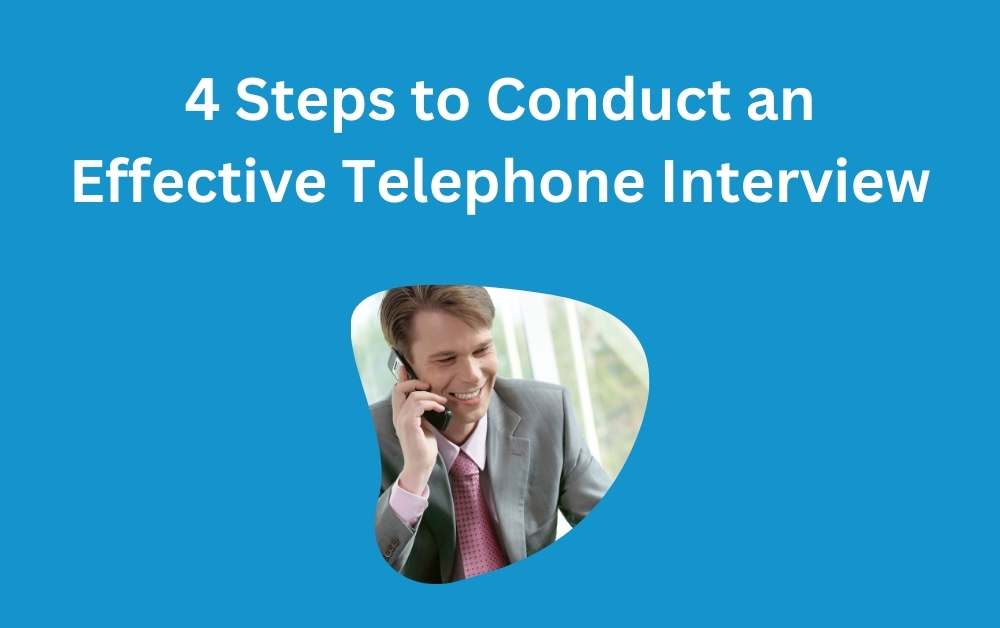The recruitment process can be very time consuming when you have the perfect candidate in mind. Being able to reduce the time it takes to find the right person can be an advantage to you and your business. A telephone interview can be the perfect solution.
The team at The HR Booth can understand through experience that finding time to conduct interviews can be difficult. We have learned that a great way to tackle this is conducting a telephone interview. This allows you to ask initial questions to ensure this is the right person to invite for a face to face interview. A Telephone interview can give you a better understanding of the candidate that may not be clear on their CV. This also allows you to prepare questions for the second part of the recruitment process.
A Telephone interview can also be considered as time consuming. We think it’s a great way to reduce the number of people you must interview face to face. This can reduce the overall time spent on your recruitment process. It allows you to short-list the candidates who are a better fit for the role.
The team at The HR Booth dedicate time to support our clients with their recruitment process, making the process of finding the perfect candidate less stressful.
Key Considerations
It can be effective to agree a suitable time and date to give the candidate the opportunity to be prepared. It’s also important that you don’t leave the candidate waiting longer than the agreed. This may lead to them to get distracted. This also can give a bad impression of you and your business.
Prepare your questions before you call any interviewees. A good form of practice is to have a telephone interview template in front of you that you can refer to.
Although we understand that every job advert will have different needs, here are some key questions that you could consider asking:
What do you know about our company?
This will allow you to assess if they have “paid attention” by reading the job advert. This also gives you a clear indication of how much effort the candidate has put in to preparing.
What is your availability to commence work?
It can be helpful to ask if employees are currently working. This allows you to know how soon they you would be able to start working for you. For example – if you require someone to start immediately and they inform you they need to work a 3-month notice period, you may decide it’s not appropriate to take this candidate any further.
What is your salary expectations?
You should be transparent in your advert and state salary level for the role. This will allow you to attract suitable candidates. Potential candidates are more likely to apply if you disclose this in the job description. It is good practice to reinforce the salary and benefits package. This will ensure your own expectations meet that of the candidates.
Do you have any restrictions on working hours?
It’s rare to find a Monday to Friday 9 to 5 job these days. You should be completely transparent in your advert around working hours, including evenings, weekends any shift work. Asking the candidate if they have any restrictions on their working hours will allow you to find out if they will be available.
You do need to be careful when asking these questions and don’t fall foul of any discriminatory laws. For example, someone may be unable to work certain hours due to child care or religious reasons. Providing you have an objective reason for not taking the interview forward, the remaining part of the recruitment process should run smoothly. The purpose of this question is to allow you to assess what you can and cannot accommodate.
Do you have holidays planned in the next 3 or 6 months?
This question allows you to forward plan. If you know what holidays the candidate have planned, you can check that you would have cover in place. You will also be able to check if this time doesn’t overlap with a key trading time.
Do you have any questions?
Giving the candidate an opportunity to ask their own questions allows to evaluate how dedicated the interviewee is. If the candidate fails to ask questions, this shows a lack of interest.
Questions related to the job role –
Holding interviews can allow you to ask some questions that can make it easier for you to decide if this is the right candidate for you. You can assess communication skills over the telephone and ask questions specific to the role. This will help as you prepare a short-list for the next stage of the recruitment process.
It is important that you ask open questions such as, ‘What similar roles have you worked in?’. This reduces the chance of receiving a simple yes or no question. This also forces the candidate to elaborate on their answer. Making your decision much easier.
Conducting the Telephone Interview
Now that you know the questions you want to ask candidates, it is now time to conduct the telephone interview.
When calling the candidates, the best way to start the conversation off is by introducing yourself and telling them where you are from. It is also effective to remind them that they recently applied for a job with yourself and check if they have time to speak.
For example –
“Good Afternoon. My name is …and I am calling from The HR Booth. You recently applied for the Administrator role. Are you free at the moment or can we agree a time for me to ask you a few questions?”
If it’s not a convenient time, ensure you agree a date and time and call them back when it is more suitable.
Going forward with the call, you will go through your questions, allowing the candidate to answer your questions while you document their response on the interview question template. Remember, these notes can be requested under the Data Protection Act, therefore avoid adding any of your personal opinions and ensure the notes are objective. You should also ensure these documents are retained for a period of up to 6 months. They must also be disposed of safely after this time (using confidential waste or a shredder).
At the end of the call, you should thank the candidate for their time. You can also ask if they have any questions and explain the next stage in the process. This will include when they will be notified if they have been successful or not, and what the next stage would entail.
Making your decision
After your conversation, it is time to decide who you want to take to the next stage.
You should refer to all your notes, and review the job description/advert again to ensure you are making an objective decision.
When you have made a final decision, you should inform the candidate. If the candidate was successful for the next stage, you can let them know over the telephone and agree a date and time to meet with them face to face.
If the candidate is unsuccessful, you should ensure you confirm this in writing (normally via email). Thank them for the interest they have shown. It is also good practice to give some feedback on their application. This leaves a positive impression about your organisation (remember, they could be a future customer!).
What other options do I have?
Dependent on the type of role and how many posts you have, you could add all these questions to your online application process. This saves any telephone screening as the system or your online system will assist your short-listing. This can be effective, but is less personal. You must ensure you maximise your time and select candidates you meet the key requirements.
If you would like further support with your recruitment process, please contact us on 01383 668178 or send us an email. We are happy to assist you with any help that you need.







